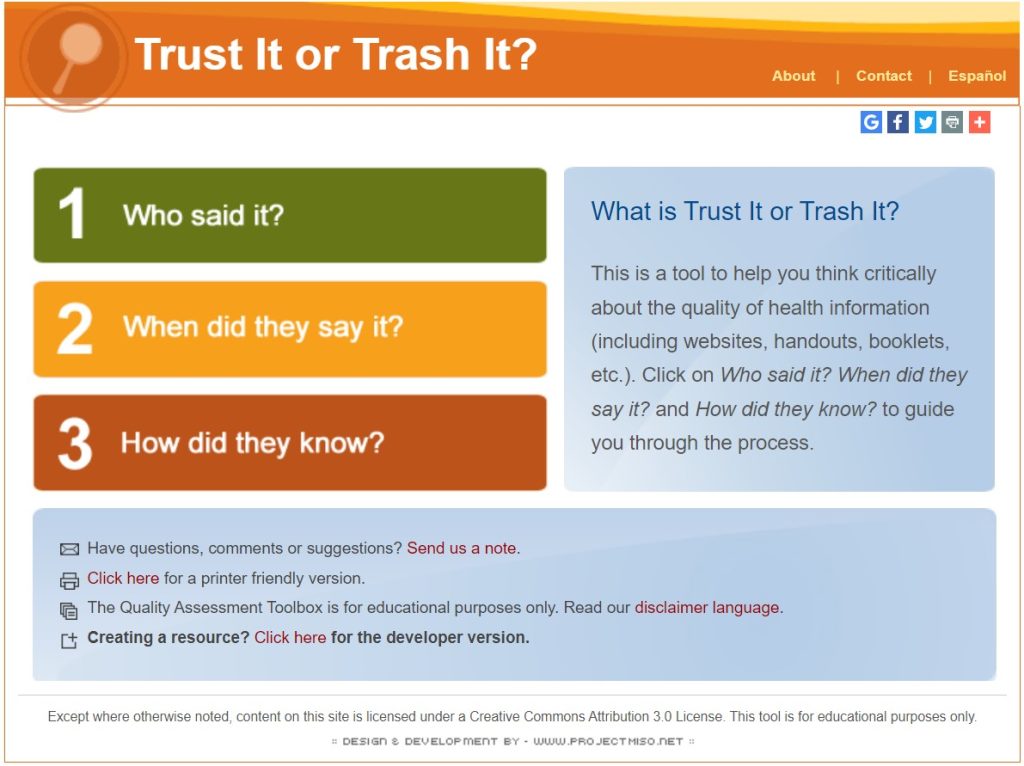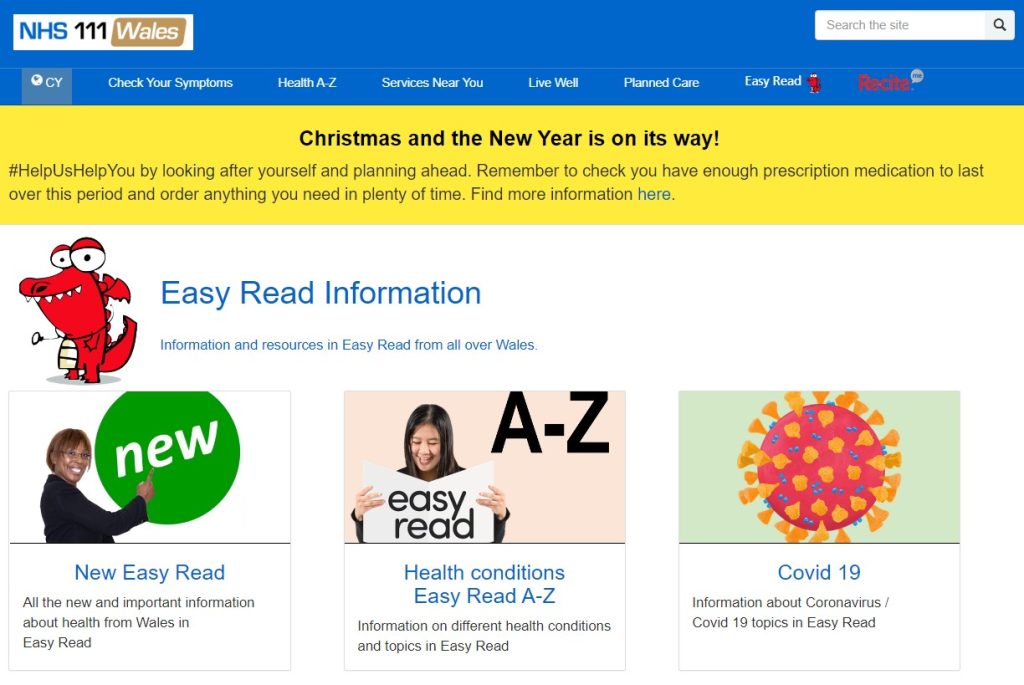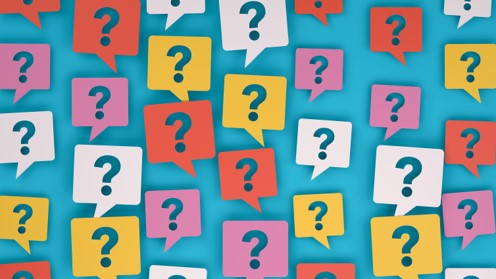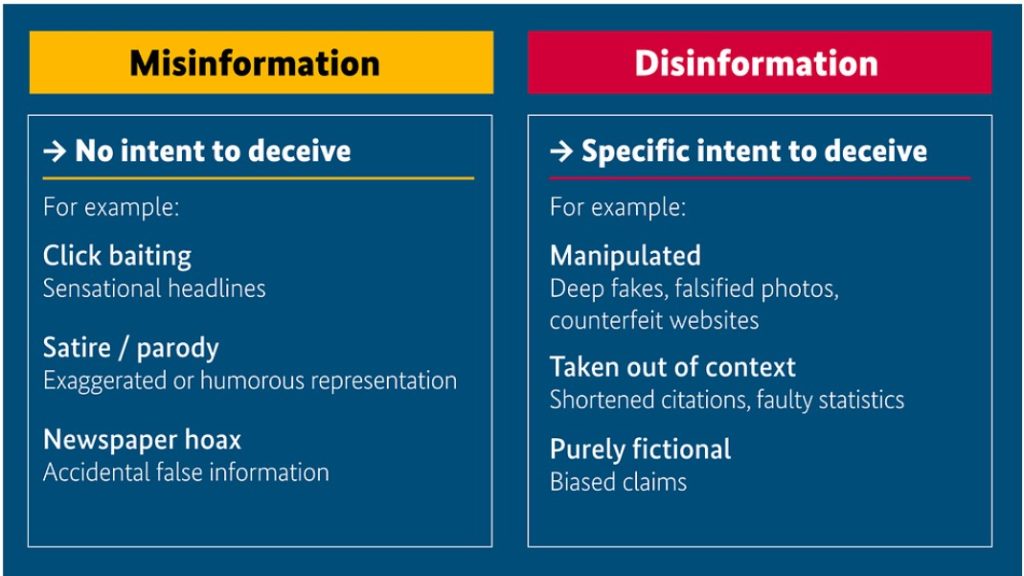One of the key lessons from the Covid-19 pandemic was about the importance of accurate, up-to-date, evidence-based and truthful information, delivered clearly and simply for the lay public. In these days of political spin and lobbying, the influence of strong, even extreme, views in the media can cloud the truth. The reach and speed of social media escalates the spread of information (good and bad) on an unprecedented scale. During the pandemic and lockdowns, we saw a tsunami of information about Covid-19 and about vaccinations. Conspiracy theories really took off and the serious problem of misinformation and disinformation became an additional challenge for already over-stretched health services. So, it seems appropriate for me to start our Health News blog series with a post about… Health News!
What is misinformation and disinformation and what’s the difference? This summary from the German Government explains it very clearly.
Why does it matter? It matters because truth and trust are fundamental to a good, positive relationship between health professionals, patients and the public. We expect health professionals to tell us the truth. On that basis we enter into a ‘contract’ with them: “You tell me the truth and I’ll work with you in managing my situation”. We then trust that they will act in our best interests in giving advice and guidance and in prescribing the best treatment for us. If this trust is shaken in any way, we start to doubt the truth. At a time of a serious national (and international) health crisis, an untrusting public can literally be fatal.
One of my roles as a member of the Community of Rhossili Support Group (CoRSG – remember them?) was to try to help keep the community informed about the virus, latest advice, vaccinations and so on. To do this, I monitored my ‘trusted news’ sites on a daily basis, sometimes more than once per day when things were moving fast. This included visiting social media sites such as Facebook where as well as the posts from the site owner (Public Health Wales, for example, or Welsh Government) anyone could add comments. I quickly became horrified at the scale of both misinformation and disinformation that was being spread through these comments. Cranks abounded. I challenged many of the comments in an effort to set the record straight, but it became very clear that irrefutable scientific facts were not going to be allowed to get in the way of a good conspiracy theory. I lobbied the post owners to moderate the comments as I believe that whilst freedom of expression is a right, unfettered access to a free national global platform to spread plain untruths isn’t. It was upsetting to see how some of the posts really troubled some viewers as they then questioned whether they should seek advice on health matters from professionals rather than from armchair experts in molecular genomic technologies. Trust was being eroded. The scale of this has led to an increase in research into behavioural science, to try and understand why people buy into conspiracy theories, but that’s another story. So how do we know who to trust when seeking healthcare information? The Trust it or Trash it website provides a simple, quick tool to use, suggesting you ask yourself 3 questions:

And they then offer a few simple pointers to when you can Trust information or Trash it.
There are some excellent Health news services and here are my top 4:
BBC Health News https://www.bbc.co.uk/news/health
The BBC Health News section is of a consistently high standard. It provides clear and comprehensive information and I particularly like the graphics they use to explain complex topics.
Public Health Wales News https://phw.nhs.wales/news/
I thought that the PHW news and Facebook sites came into their own during the pandemic. They provided daily updates on statistics through their comprehensive Data Dashboard and clear, brief summaries through their Facebook page (https://www.facebook.com/PublicHealthWales). Again, some great infographics. Importantly, they also provide Easy read information and leaflets on their website.
Swansea Bay Health News https://sbuhb.nhs.wales/news/swansea-bay-health-news/
The News section is part of the wider website for our local health region. The whole site is very comprehensive across all health services within the region. The News is a mix of local and some wider interest stories.
NHS 111 Wales https://111.wales.nhs.uk/
Again, a good, comprehensive site with advice, information and news on current health matters. Good infographics and that all-important Easy-read option is a great facility.

Maggie Kirk
December 2022


